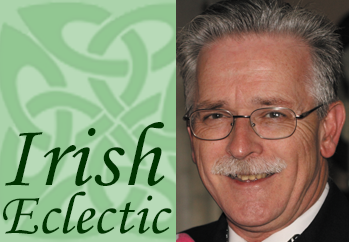Oscar Wilde: A Proud Son of Ireland
Opinion Advocates for ideas and draws conclusions based on the author/producer’s interpretation of facts and data.
 By Brian McGowan
By Brian McGowan
June is a month that most often brings up tales of James Joyce and his master work, “Ulysses,” or treatment of ancient Celtic festivals, such as Mid-Summer Eve. Been there in these pages; done that!
This month we will look at an Irish author some are still reluctant to embrace, yet whose clear genius jumps from every page of prose, poetry or play he gave birth to in his short lifespan of 46 years. A man of unconventional behaviors, he was slighted sorely when alive due to phobias of 19th century society. Sadly, such fears are still extant today despite our dedication of a month to the premise that all humans deserve respect, regardless of differences in sexual orientation or gender identification.
And so, in recognition of June being Pride Month, we focus today on Oscar Wilde, a man of wit and wisdom whose brilliant rise to fame was followed by a bitter descent into vilification, poverty and an early grave.
Born on Oct. 16, 1854, in Dublin, Ireland, he sprang from a prominent Anglo-Irish Protestant family whose roots in Ireland stretched back to the 1690s. His father, William Wilde, was a renowned ophthalmic physician, greatly concerned with the plight of Ireland’s poor and indigent. His mother, Jane Francesca Elgee, was an accomplished poet and an open supporter of the “Young Ireland” movement and their abortive Rebellion of 1848.
Privilege had its perks, and Wilde received an excellent education. Graduating from Trinity College in Dublin in 1874, he went on to Oxford, where he completed his studies in 1878 and published his first poem, “Ravenna.”
London came next, and he was recognized as an emerging writer. America beckoned. In 1882, he spent nine months on the lecture circuit, rubbing shoulders with some of America’s most eminent minds, including Longfellow, Holmes and Whitman.
Returning to England, he married, in 1884, Constance Lloyd, a beautiful woman of great wealth. The couple had two sons in quick succession, Cyril in 1885 and Vyvyan in 1886, and Wilde entered a period when he produced most of his most famous works, including his only novel, “The Picture of Dorian Gray.” To this day it holds a place in many high school curricula, though often lambasted by unforgiving critics.
Plays also figured prominently in his output, and became his favored creative vehicle. “Lady Windermere’s Fan,” “A Woman of No Importance,” “An Ideal Husband” and his most famous play, “The Importance of Being Earnest,” were all produced during this period.
But in 1895, the same year that ‘Earnest’ secured him much-deserved fame, his world fell apart. Wilde was having an affair with a young Englishman, Lord Alfred Douglas, son of the powerful Marquess of Queensbury. Queensbury discovered the affair, and left an insulting note at Wilde’s residence when he went to confront him. Wilde responded by suing Queensbury for libel.
In the ensuing trial, Queensbury’s legal team produced copious evidence of Wilde’s romantic involvement with Douglas. Wilde quickly dropped the libel charge, but the damage had already been done. He was in turn arrested and charged with “gross indecency.” His sentence? Two years imprisonment at hard labor, to be served in Reading Gaol.
The experience broke Wilde, physically, mentally and emotionally. When he was finally released in 1897, he was a shadow of his former self and wrote very little, save one of his most enduring poems, “The Ballad of Reading Gaol,” which recounted his experiences while incarcerated. He spent the next few years living in France, where he contracted meningitis and died on Nov. 30, 1900, at the age of 46.
Honest about himself throughout his life, he has many quotes attributed to him, including the famous line, “I can resist everything except temptation.” Though he is remembered more for his unapologetic lifestyle than his literary accomplishments, those accomplishments have carved a niche for him as creator of some of the greatest masterpieces of late Victorian literature; a master of individuality, an Irishman and someone to be proud of.
Longtime Pleasantville resident Brian McGowan was born and raised in the Bronx and is a second-, third- and fifth-generation Irish-American/Canadian, as his immigrant ancestors followed several paths to the New World. Reach him at brian.m.mcgowan1952@gmail.com. He is the author of three books: “Thunder at Noon,” about the Battle of Waterloo; “Love, Son John,” about World War II; and “Island Prize,” about the Revolutionary War in 1776 New York. All are available at Amazon.com.

Examiner Media – Keeping you informed with professionally-reported local news, features, and sports coverage.
